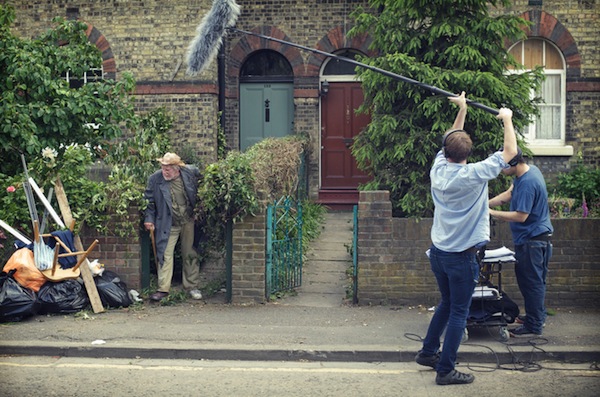You have no items in your cart. Want to get some nice things?
Go shoppingAudience-bankrolling is providing a solution to micro-budget films when arts funds are low and distributors take few risks. The case of Borrowed Time, Jules Bishop’s crowdfunded film set in East London.
Kevin is not having a good day. He owes ‘Ninja’ Nigel money, his sister doesn’t want to see him, and his friends suggest burglary as a solution to his problems. This is how Kevin finds himself in the home of cranky old man Philip, who holds Kevin hostage with the help of an antique blunderbuss of a gun. It’s the start of an unlikely friendship.
The film follows Kevin (Theo Barklem-Biggs) as he simultaneously tries to bond with Philip, avoid Nigel, and reconnect with his sister Becky and her son Grant. Set against the backdrop of east London in the shadow of the Olympic Stadium, Borrowed Time is bittersweet, charming and occasionally hilarious.
The cast are uniformly good, from Theo Barklem-Biggs’ growing assertiveness as Kevin to Phil Davis’ channeling of Clint Eastwood as Philip, and from Warren Brown’s menacing yet ridiculous Nigel to Juliet Oldfield’s sensible Becky, who ends up showing Nigel a thing or two about being menacing. Young Ted Cozzolino, as four-year-old Grant, is a natural in front of the camera.
The film is a product of the Film London Microwave scheme, which challenges debut film-makers to produce features for no more than £120,000, offering practical advice, mentoring and support, and up to half the cash budget. Launched in 2006, the scheme has had some notable successes, with all seven of the completed films achieving theatrical distribution in the UK. Previous films produced by the scheme include Strawberry Fields, Ill Manors, The British Guide to Showing Off and the BAFTA-nominated Shifty. Microwave recently announced that Lilting, currently in post-production, has been picked up by Protagonist Pictures and Artificial Eye.
Borrowed Time fit the scheme’s criteria, with a tightly focused script, a short production schedule and commercial potential. It also shows what can be done with limited resources. Shot over 18 days, there’s no hint on the screen of the limited budget. First-time writer-director Jules Bishop acknowledges this was a challenge.
“We set about finding the magic in the mundane, these small moments that can just give the film production value, from the performances to the locations, just making the most of everything,” he says. “I think if you just chuck money at every problem then you end up with something generic. In the end the most creative decisions come from some sort of deprivation.”
However, shooting the movie was only the first hurdle. In an era of blockbuster-laden cinema screens, with star names almost guaranteed to fill seats (or so the producers hope) distribution turned out to be a problem. When Bishop and producer Oliver Kaempfer first approached Microwave in 2009, micro-budget films were a fresh concept, but by the time the film was completed in 2012 the market was full of such films, all of them competing with big-budget movies for limited screen slots, and distributors reluctant to take a risk on a small film with no household names.
The production team turned to crowdfunding platform Kickstarter to raise the distribution budget. Offering a range of incentives, everything from a “Thank you” message on the film’s Facebook page, signed copies of the script, to drinks with the director and cast, the team successfully raised the money in February 2013. This not only enabled them to cover the logistics of distribution, but also showed there was a demand for this small, quirky British movie, which no doubt helped to persuade cinemas to take the film.
It was a risk, as crowdfunding is by no means a sure thing. On Kickstarter, if a project doesn’t reach its target, everyone gets their money back. If it works, though, a project not only gets funding, it also gets a built-in marketing push, as everyone who has donated their hard-earned cash is guaranteed to spread the word.
If the film turns out to be bad, this approach could backfire horribly. In the case of Borrowed Time, the film’s many backers can rest assured that their money was well spent. It’s a gem of a movie, and deserves to be seen.

About Paris Franz
Paris Franz is a freelance writer based in London. Her short stories and articles have been published in the United Kingdom, Ireland and China. She studied history and archaeology at the University of London and the arts of Asia at the Victoria and Albert Museum, which greatly influenced her love of history, travel and story-telling. She is the author of the travel collection 'Treading Lightly.'





